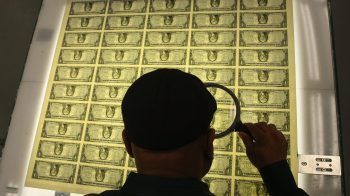At least Americans are buying things
TEXT OF STORY
KAI RYSSDAL: Maybe it’s just me, but it feels like we’ve been talking about the dollar a lot lately. How it’s not all that healthy compared to a lot of other currencies. One saving grace has been that a weaker dollar means America-made goods are a better deal overseas. So it was some surprise this morning when we learned the U.S. trade deficit shot up in September. A whole bunch, too — the biggest monthly jump in a decade. Imbalances between what we buy from overseas and what we sell abroad can be an economic drag.
Our Washington bureau chief John Dimsdale reports there is another way of looking at it.
John Dimsdale: At least American consumers are buying things again. Yes, the cheap dollar helped boost exports 3 percent. But imports jumped nearly 6 percent. Some of that was due to higher prices for imported oil.
But Morgan Stanley’s Ted Wieseman says the rest can be attributed to economic recovery.
Ted Wieseman: It’s definitely an encouraging medium-term sign that the imports and exports are both recovering pretty strongly. Y’know, it’s hard to be terribly disappointed by that strong an import number, because it ultimately does reflect the strength of domestic demand.
Most economists expected the dollar’s decline to keep trade deficits in check. But Clyde Prestowitz with the Economic Strategy Institute says the dollar’s not falling everywhere.
Clyde Prestowitz: The big Asian countries, China foremost, but Korea, Taiwan, Singapore and many others, are pegging their currencies to the dollar. So the dollar has not weakened against them.
That could be changing, at least a bit. China has been sending signals it will let its currency, the yuan, move higher against the dollar.
Former Commerce Department trade official David Rothkopf says that’s not because of any skillful diplomacy by President Barack Obama.
David Rothkopf: China is increasingly becoming a consuming economy. And it needs a strong yuan so that when it imports things, it gets more value for each yuan used.
In the future, Rothkopf expects the yuan to rise a bit and the dollar to fall a bit more. Both trends should help bring trade between the two countries more into balance.
In Washington, I’m John Dimsdale for Marketplace.
There’s a lot happening in the world. Through it all, Marketplace is here for you.
You rely on Marketplace to break down the world’s events and tell you how it affects you in a fact-based, approachable way. We rely on your financial support to keep making that possible.
Your donation today powers the independent journalism that you rely on. For just $5/month, you can help sustain Marketplace so we can keep reporting on the things that matter to you.


















